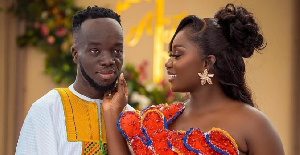- Home - News
- TWI News | TV
- Polls
- Year In Review
- News Archive
- Crime & Punishment
- Politics
- Regional
- Editorial
- Health
- Ghanaians Abroad
- Tabloid
- Africa
- Religion
- Election 2020
- Coronavirus
- News Videos | TV
- Photo Archives
- News Headlines
- Press Release
General News of Thursday, 2 December 2010
Source: Weekly Insight
Nkrumah against political dynasty
Osagyefo Dr. Kwame Nkrumah, First President of Ghana was firmly opposed to the emergence of a political dynasty in Ghana.
In a letter to Mrs Shirley G. Du Bois, Director of Television in 1964, Nkrumah made it clear that members of his immediate family ought to be treated like all other Ghanaians and that the fact of their relations to him should not make them special.
Nkrumah wrote “you will appreciate that my office as a President of Ghana is not a hereditary one, like that of a Monarch or Emperor. It is therefore not in the best interest of the children, nor is it wise to encourage them to live in an artificial atmosphere which they cannot maintain without me when they grow up and have to fend for themselves like any other citizen of Ghana”
He was reacting to a suggestion by Shirley to pose with his family in the Flagstaff House for a Japanese television crew.
Nkrumah was firm in his belief that his children should not gain any special political advantages over other citizens simply because he is their father.
The full text of Nkrumah's letter is reproduced below;
12th November, 1964
My Dear Shirley
Thank you for your letter of the 6th November, suggesting that NHK should film me and my family in the gardens of Flagstaff House on Sunday.
Although I appreciate your reasons for suggesting this, I have to say quite firmly and definitely that I am not in favour of it. I would like to take this opportunity to explain why and to express a little of my own thinking about marriage.
You will appreciate that my Office as President of Ghana is not a hereditory one, like that of a Monarch or Emperor. It is therefore not in the best interest of the children, nor is it wise, to encourage them to live in an artificial atmosphere which they cannot maintain without me when they grow up and have to fend for themselves like any other citizens of Ghana. I consider it important to ensure that my wife and the children are allowed to live a normal private life, free from the entanglements of public obligations.
Indeed, I regard it as my bounden duty to protect them from the glare of undue publicity.
People in general seem to be insatiably curious about the family and private lives of those who are in the public eye. It has always been my strong conviction that my domestic affairs – my home and my family – are purely private matters which should not be “mixed up” with my official and public life. I see no reason why I should exhibit my wife and children in order to satisfy public curiousity.
My view – and this may jolt you a little, Shirley! – is that marriage does not exist in nature and does not warrant the importance that has come to be attached to it. It is a bourgeoise imposition, a mere contrivance set up as a matter of human convenience for the protecting of inheritance rights, capitalists and property-owners.
To sum up – I am most anxious that no one should tamper with my own liberty within my family. Irrespective of my present position, I still look upon my family as a private concern and not as an instrument of projecting a personality of myself either as an individual or as Head of State. You know that any advantage that is based on privilege rather than on merit is both illusory and unnatural.
I have no objection to NHK filming me when I am alone or engaged in some State activity. But other than this, I refuse to budge one inch!
Yours very sincerely,
Kwame Nkrumah










